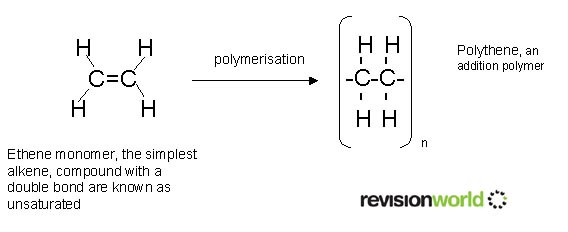Plastics and Polymers
Alkenes are reactive and so are useful for making many other substances including polymers.
Polymers have very large molecules. They are formed when many small molecules join together. This process is called polymerisation.
When alkenes join together to form a polymer with no other substance being produced in the reaction, the process is called addition polymerisation.
Plastics are polymers and are made by polymerisation.
Example: poly(ethene) (often called polythene) is made by polymerising the simplest alkene, ethene.

Sources of Plastic - where they are from and the processes involved
Plastic has to be sourced and goes through several processes before it is 'workable' and can be made into the different stock forms ready to be manufactured.
Key points and basics:
- Plastics are either found naturally or are synthetic man-made
- The majority of everyday plastics are synthetic
- From crude oil compounds are formed called polymers - which is plastic
Synthetic plastics - Most plastics used today are man-made, known as synthetic. The main source of synthetic plastic is crude oil, although coal and natural gas are also used.
Most polymers (plastics) are made from combining the element carbon with one or more other elements such as hydrogen, chlorine, fluorine or nitrogen.
The process from crude oil:
1) During the refining of crude oil petrol, paraffin, lubricating oil and petrol are the bi-products.
2) These are then broken down into monomers. (which is a chemical substance consisting of one molecule)
3) When 1000's of monomers are linked together this is called 'Polymerisation' - the compounds formed are called Polymers - and plastic is the common name for Polymers!
Natural plastics - Plastic can be found naturally and occur in such things as:
- Plants - from which cellulose can be extracted.
- Trees - from which latex, amber and resin can be extracted.
- Animals- from which horn and milk (used to make glues) are obtained.
- insects - from which shellac (used to make polish) is obtained.
A useful link to a plastic company is http://www.stephensinjectionmoulding.co.uk
This video explains about Plastics and Polymerisation

